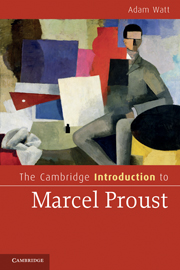Introduction
Published online by Cambridge University Press: 05 June 2012
Summary
By anyone's standards, Proust's A la recherche du temps perdu (In Search of Lost Time, 1913–27) is a very long book: seven novels combine into a single overarching narrative, whose multiple strands keep even the most committed readers occupied for months, even years. Time, therefore, is an integral part of the enterprise. The story is relatively simple: an individual narrates his life in the first person, seeking to determine what it amounts to and whether he has it in him to become a writer. To read the novel, however, involves relearning our experience of time, not only in the novel's radically unconventional structuring but in its themes and the ways in which it takes over our empty minutes, fills our cramped commuter journeys and our soaks in the bathtub with expansiveness and capaciousness previously unknown in literature. A single evening party stretches out to fill scores of pages; and the fleeting real-time duration of sensations – a smell, a sound – are drawn out and intensified by the onward rush of prose that seeks tirelessly to capture every conceivable contour of human experience. This is not time wasted. It is time revitalized or, rather, it is the novel sensitizing us to literary time and, through this, to a store of experiential riches in the real world that might otherwise pass us by.
- Type
- Chapter
- Information
- The Cambridge Introduction to Marcel Proust , pp. 1 - 4Publisher: Cambridge University PressPrint publication year: 2011

